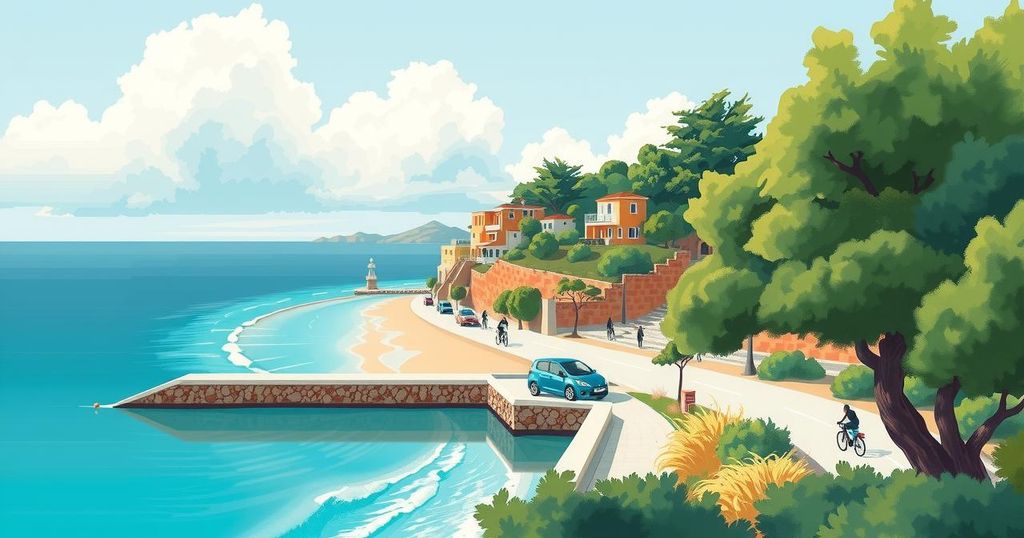U.S. Travel Ban, Ibiza Vehicle Restrictions, and Norwegian Tourism Tax

The U.S. has banned travel from several nations due to security concerns. Ibiza introduces vehicle restrictions to combat overtourism, while Norway launches a tourism tax for better infrastructure. Additionally, unexpected obstacles disrupted a transatlantic flight and a cruise experience due to severe weather. The travel landscape is rapidly changing, influenced by security and environmental measures.
In significant global developments, the U.S. has imposed a travel ban affecting several nations, including Yemen, Sudan, Iran, Libya, Somalia, Afghanistan, Haiti, Chad, Congo-Brazzaville, Myanmar, Equatorial Guinea, and Eritrea. This decision arises from escalating concerns about national security. Meanwhile, Ibiza, a major tourist spot in Spain, has rolled out strict vehicle restrictions for nonresidents, aiming to combat overtourism during the busy summer months.
Starting June 1 and continuing until September 30, Ibiza will allow only a limited number of vehicles—20,168 to be exact—mainly targeting rental companies. Specifically, 16,000 are set for rental fleets; the remainder will accommodate cars from areas beyond the island, including mainland Spain. Tourists will be required to pay a €1 daily fee for a driving permit, and caravan travelers need to reserve spots at designated campsites. Interestingly, bicycles are exempt from these restrictions.
This initiative aims to alleviate traffic congestion on the island, which sees over three million visitors annually compared to a local population of around 160,000. The number of vehicles on the island has quadrupled from approximately 51,000 in 2002 to now exceeding 200,000. Such changes are crucial for maintaining the island’s infrastructure amidst ever-increasing tourist numbers.
On another front, Norway has introduced a tourist tax designed to better manage the surge of visitors while enhancing local infrastructure. Municipalities across the country can now levies up to a three percent tax on overnight stays, following a notable rise in international visitors. With the aim of supporting improvements for residents and tourists alike, local governments now have the flexibility to adapt the tax rate according to demand and seasonal fluctuations.
Norwegian tourism has experienced a boom, with over 38 million overnight bookings in the last year alone. This tax aligns Norway with other prominent European cities like Paris and Venice, all of which have adopted tourism levies to mitigate the impact of mass tourism on local ecosystems and resources.
In a surprising airline incident, a flight from the U.S. bound for Naples had to reroute to Rome due to airport constraints, triggered by a larger-than-usual aircraft. Passengers were eventually transferred to their destination by bus, highlighting the necessity for better planning as airliners increasingly deploy larger jets on transatlantic routes—a situation that can lead to unforeseen complications.
Additionally, the maritime industry faced turmoil as a cruise ship in Sicily experienced strong winds that disrupted docking procedures. A guest was pulled into the water during this chaotic episode, but thankfully was rescued and treated for minor injuries. Winds clocking in at 45 mph contributed to ship instability, emphasizing the unpredictable challenges posed by weather conditions in the cruise sector.
As for the newly enforced U.S. travel ban, this affects nationals from 12 specified countries with full entry restrictions on several of them, including Afghanistan and Libya. Some categories of travelers, such as diplomats, may find exemptions, but for general travelers, this brings significant barriers to mobility and tourism.
Conclusively, the travel landscape continues to shift dramatically, whether through new management strategies in tourist hotspots, environmental challenges faced by the cruise industry, or stringent travel regulations stemming from international security concerns. As travelers navigate these changes, staying informed about local policies will be essential for a smooth journey.
In sum, the U.S. travel ban reflects rising national security concerns while Ibiza and Norway are taking proactive measures to control tourist influx and support local infrastructure. Recent airline and maritime incidents illustrate the operational challenges in international travel. As the global travel environment evolves, continuous updates on regulations and conditions will be vital for travelers.
Original Source: www.travelandtourworld.com






